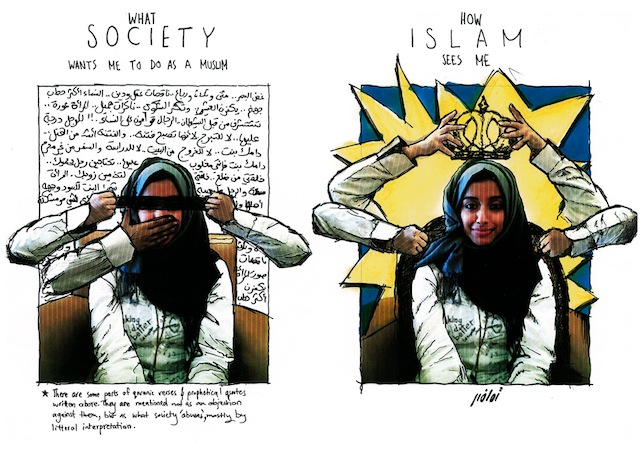BY DAPHNE AUZA
Upon entering the IMOW Muslima website, one finds a colorful array of art and intriguing headlines linking to multimedia projects created by Muslim women around the world. Many of the images challenge the typical visual representations of Muslims found in the media. Instead of stereotypical images of exoticization and victimization, these pieces portray the diverse experiences and empowered voices of modern Muslim women.
Muslima: Muslim Women’s Art and Voices is a global online exhibition by the International Museum of Women, a non-profit organization based in San Francisco. Its collection of art, long-form written pieces and multimedia projects grows daily as it encourages Muslim women to contribute their individual stories. The exhibit’s primary mission is to shatter the homogenous perspective of this community that pervades the Western hemisphere.

The website, which launched on March 8, 2013, is curated by Samina Ali, the award-winning author of Madras on Rainy Days. She is joined by a group of curators representing partner museums in Denmark, the Philippines and the United Arab Emirates. Their participation increases the scope of Muslim women narratives that the exhibit covers.
Much of their work has consisted of scouring the globe for Muslim women’s unique stories and reaching out to thought leaders making an impact in their community. Their exclusive interviews profile the likes of Nobel Peace Prize winner Shirin Ebadi of Iran; the first female prosecutor of Afghanistan Sima Samar; and Sudanese women’s rights activist Fahima Shahim.
The virtual aspect of Muslima makes the exhibit a particularly unique experience. While media outlets such as television and film have historically perpetuated negative stereotypes of Islam, the website’s construction has permitted Muslim women to create a space external to the mainstream gaze. The exhibit breaks not only ideological barriers, but also geographical ones. Using a website platform, these thought-provoking images depicting the contemporary lives of Muslim women become more accessible to a curious international audience.
Another interesting aspect of the exhibit is its focus on fueling dialogue. The section “Muslima Stories” asks Muslim women to describe their life in relation to their beliefs in six words. Many of these mini memoirs express the writer’s desire to be seen outside of the categories under which others tend to file Muslim women. “I don’t live life out of the box,” Shireen Ahmed from Canada said as an explanation for her six word narrative about being a mother, soccer player and cat owner. “I live life like there is no box.”
Many of the pieces in the art gallery showcase challenges to popular assumptions about Muslim culture. In her series of paintings called “Technicolor Muslimah”, artist Saba Chaudhry Barnard depicts women wearing headscarves as a suggestion of their religion. Yet the portraits implore the observer to consider other dimensions of these women’s being as they are painted in bright colors making comical expressions and wearing novel objects like Mickey Mouse ears and fake moustaches.

Considering the nature of the works that fill the exhibit, it serves as much more than a place for observation and absorption; it is a call to action. Through Muslima’s “Speak Up! Listen Up!” campaign, visitors can pledge to be a part of the solution to end Islamophobia. Its mission parallels the exhibit’s goal to eradicate negative and pervasive stereotypes by maintaining a flow of conversation around the subject of Muslim identity.
According to the website, the word muslima indicates a woman who believes in God and upholds God’s values. Muslima aims to document the variety of experiences that occur at this intersection of identifying as both a Muslim and a woman in a post 9/11 society.
Muslima: Muslim Women’s Art and Voices will remain live until the end of this year.




